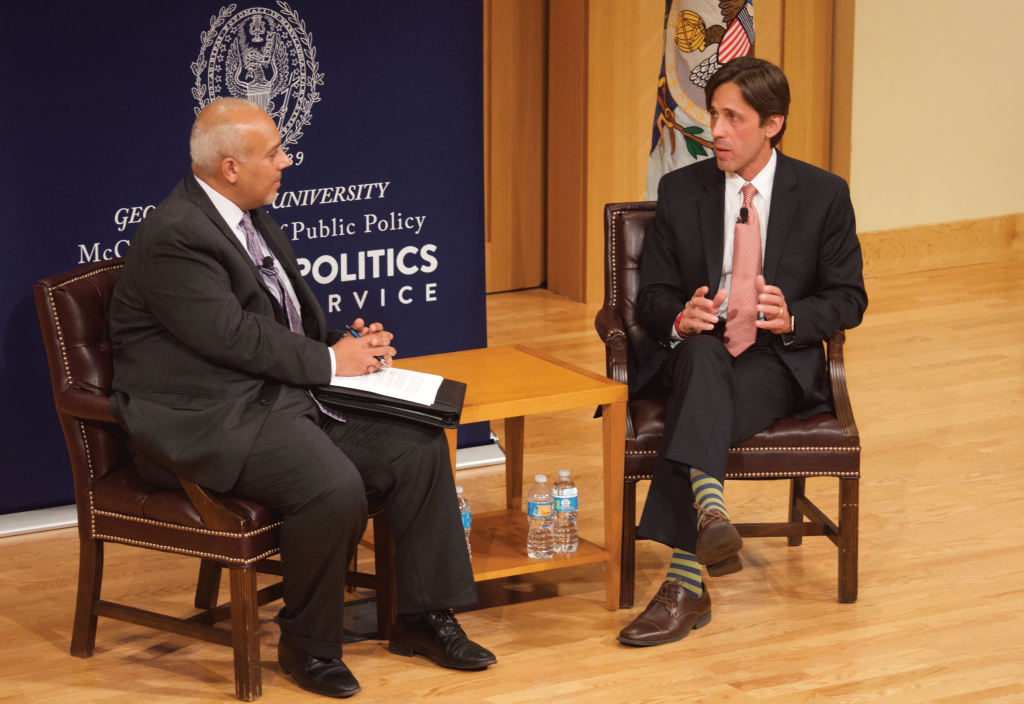
David Simas, assistant to the president, argued that Republicans in Congress challenged President Barack Obama’s desire to collaborate during his term Wednesday.
President Barack Obama’s collaborative tendencies were put to the test by noncompliant Republicans in Congress during his second term, according to David Simas, assistant to the president and director of the Office of Political Strategy and Outreach at the White House, at a discussion Wednesday.
The Republican-majority Congress has rendered it nearly impossible to pass legislation.
“He does not, from the beginning, tell people what their problems are that need to be solved,” Simas said. “The job of a community organizer at first is to listen to people, to identify their needs, and then, most importantly, to begin to connect them together regardless of their opinion and their points of view to form a consensus.”
Simas’ speech was the fourth installment of the McCourt School of Public Policy’s Institute of Politics and Public Service’s “The Exit Interview” series, a six-part lecture program focusing on the legacy of the Obama administration.
Wednesday’s lecture centered on the political culture in Washington, D.C., with a particular focus on Obama’s tendency to cooperate with Republicans rather than to oppose them.
“That’s always been his orientation, from a community organizer in South Chicago to the Illinois State Senate, where he would reach across the aisle and spend time with Republicans,” Simas said. “That has always been and was the predicate of what he believes — how change occurs, but also how you can bring people together.”
During the event in Lohrfink Auditorium, Simas said despite Obama’s collaborative nature, partisan clashes made it nearly impossible for him to execute his campaign promises.
Simas said Obama’s campaign promise to fix a broken political system appealed to a country divided by the war on terrorism and the 2008 economic recession.
“When Lehman Brothers collapsed on Sept. 15, 2008, our politics changed from that moment forward. The campaigns, the rhetoric, the approaches, the issues that had existed before that moment, as of that day, changed,” Simas said. “Any discussion about the Obama presidency without being rooted in that seminal moment and then what it did, not only to the populous as a whole, but also to the two political parties in response to it, that needs to be front and center.”
Simas said Obama was able to pass his stimulus bill, the American Recovery and Reinvestment Act of 2009, as well as the Patient Protection and Affordable Care Act of 2010 because of a Democratic congressional majority during the first two years of his administration. However, Republicans were able to take control of the House of Representatives in 2010 and the Senate in 2014 because of the perception that the economy was not improving.
“Clearly the scope of what happened was bigger than folks had anticipated,” Simas said. “And in retrospect, when you have unemployment at 10 percent in that year and recovery that was beginning in very early stages, that explains to a large extent what happened.”
Simas said while Obama attempted to spur cooperation in solving America’s economic woes during his first days in government, tense relationships between Democrats and Republicans rendered this a difficult feat to accomplish. Simas owed a lot of the gridlock in the District to Republican noncompliance.
“Frankly, the strategic decision that was made at that point by our friends on the other side was, ‘They have the votes, this is going to be no matter what happens, deeply unpopular because of the fault lines of what happened in the final days of the Bush administration,’” Simas said. “‘There is going to be a hands-off approach.’”
Despite the difficult political situation faced by America, Simas urged students to become active in their communities.
“Remember who you are and what you represent. Regardless of what your political beliefs are, determine what is that North Star that you have — what is that passion of what you truly, truly believe — and even though things are hard, continue to work toward making your community, your country, the state that you live in, what thing that you are most passionate about, a little bit better than when you found it,” Simas said.
The “Exit Interview” series has previously hosted Attorney General Loretta Lynch, National Security Advisor Susan Rice and U.S. Health and Human Services Secretary Sylvia Mathews Burwell since its launch Sept. 15.
Maria Cornell (SFS ’20), an attendee, found Simas’ closing remarks particularly memorable.
“It was really nice to hear what David Simas had to say,” Cornell said. “Especially with his closing remarks about staying engaged despite your possible dissent towards the upcoming administration, so it was nice to hear his perspective on that, and echoing the idea that everyone has power and you can exercise it.”




















